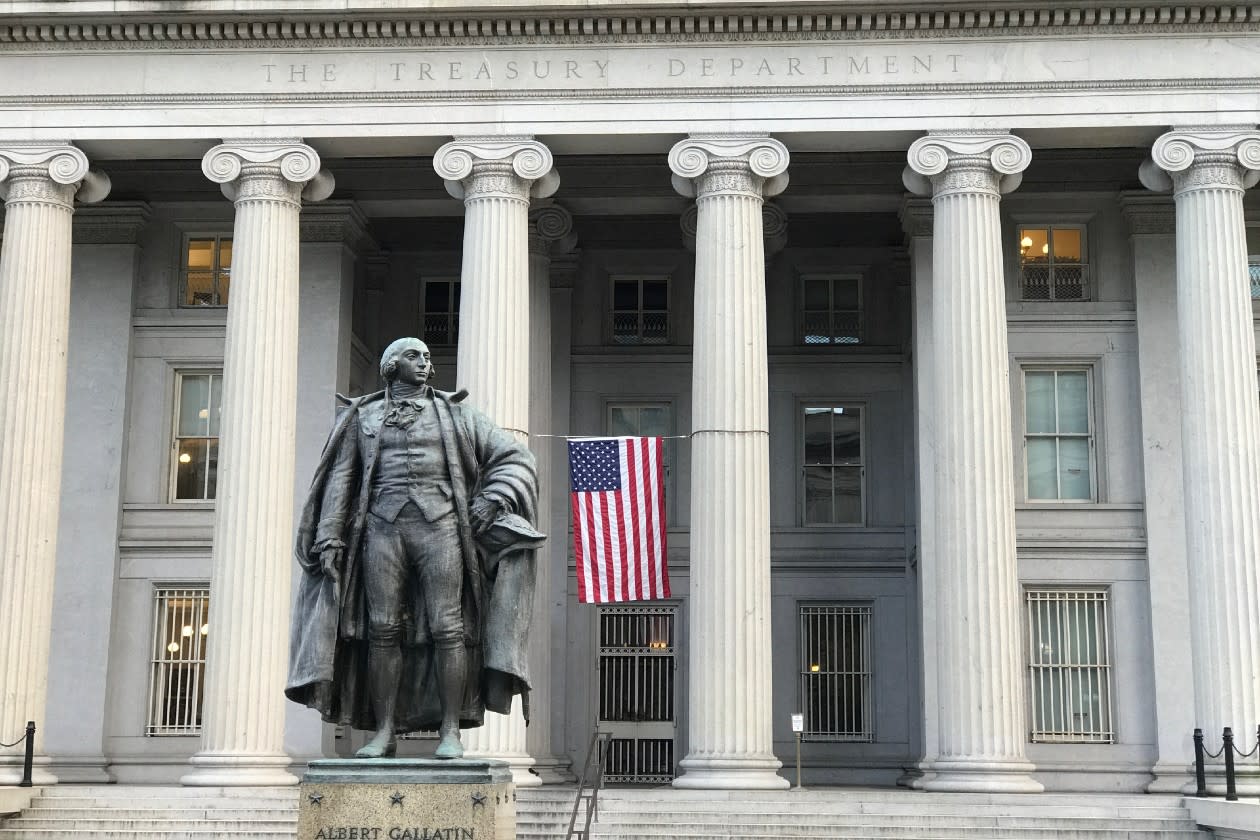Moody's, one of the three major credit rating agencies, downgraded the US government’s credit rating late last week.
Rating agencies like Moody's, S&P, and Fitch assess the creditworthiness of issuers – including sovereign governments – to guide investors on the likelihood of repayment.
The Moody’s downgrade follows similar moves from S&P and Fitch who cut their ratings of US sovereign debt back in 2011 and 2023 respectively.
But how did the market react and what could be next for investors?
I sat down with HL Multi-Asset Fund Managers Tom Wells and David Smith to discuss what it means for investors.
This article isn’t personal advice. Remember, investments rise and fall in value, so you could get back less than you invest. Yields are variable and aren’t a guide to future income. If you’re not sure if an investment’s right for you, ask for financial advice.
What does it mean for markets?
After opening lower on Monday morning, markets were quick to shrug off Monday’s downgrade with the US stock market rallying through the day to close higher.
It was a similar story for bond markets – a sharp initial drop in price followed by a rally to close higher.
But, as fund manager Tom Wells explained, the real issue isn’t the downgrade itself, but the underlying cause of it – the state of the US public finances.
By the end of 2024, total US national debt was far larger than the size of the US economy, according to the St Louis Federal Reserve.
The US government also runs a large deficit – spending more than it brings in through taxation.
In the 2024 fiscal year, the gap between its expenditure and receipts reached $1.8tn. This means the debt pile is only getting larger, taking up an increasing share of tax receipts to service the interest due.
There are three ways to fix this imbalance.
The first is to grow the economy – and therefore the tax take – faster than spending rises. This would allow the government to stop adding to their debt each year. However, the USA is already a highly developed economy and achieving the kind of growth needed to reduce the debt without wider policy changes seems unrealistic.
A second way is to increase taxes overall, which doesn’t seem to be an option for the current administration.
The third solution is to spend less to balance the books.
The biggest sources of US government spending are on social security benefits, interest payments on the government’s existing debt, healthcare and defence.
In our view, cutting any of the big-ticket expenditures would be politically unpalatable, which would make cutting the deficit through these means difficult to achieve.
US government spending, 2025 year to date
We think the fiscal problem is structural and will persist, with long-term risks increasing over time.
We also don’t think there’s any chance of the US defaulting on their debt, but we think there are better opportunities elsewhere for those seeking income.
Investing for income – where looks attractive?
A global and diversified approach to income investing is key.
Rather than focus on bonds issued by governments, investors could consider high-quality corporate bonds instead.
Corporate balance sheets remain in good shape overall. In fact, HL fund Manager David Smith crunched the numbers and concluded that high-quality corporate bonds offer almost one and a half times the income available through global government bonds.
But these bonds do come with slightly higher credit risk (the risk that companies default on debt repayments).
Another option is dividend-paying shares.
Companies with strong cash flows and solid dividend track records can offer resilient income even in tougher environments. In the hands of a skilled stock picker, this approach combines income potential with the possibility of capital growth.
Finally, a multi-asset income approach could appeal to investors who prefer a hands-off solution.
These funds blend global shares and bonds, so investors are less exposed to any single segment of the market.
A professional fund manager carefully selects and monitors the underlying investments, making changes as necessary. This provides broad diversification and the potential for a more resilient income.
Looking for inspiration? – 3 fund ideas
Whether you’d prefer to build your own portfolio or invest in an all-in-one ready-made fund, here are three fund ideas to consider if you want to leave investing for income to an expert.
Investing in these funds isn’t right for everyone. Investors should only invest if the fund’s objectives are aligned with their own, and there’s a specific need for the type of investment being made. Investors should understand the specific risks of a fund before they invest, and make sure any new investment forms part of a diversified portfolio.
For more details on each fund and its risks, use the links to their factsheets and key investor information.
HL Building Block Funds
These funds offer lots of diversification across different parts of the world.
You can use these funds to build or add to an existing investment portfolio.
You’ll get a dedicated team of experts managing your investments for you – picking the best managers in each section to perform in a range of different market conditions.
The following funds are run by Hargreaves Lansdown Fund Managers Ltd., part of the Hargreaves Lansdown Group.
HL Global Corporate Bond fund
This fund offers investors a diversified portfolio of high-quality bonds from companies around the world that aims to pay a smooth monthly income.
The fund aims to deliver a greater total return than its benchmark over any 5-year period.
The fund can invest in high yield bonds which have the potential to increase returns, but also increase the risk.
HL Global Equity Income fund
This fund invests in companies across global markets, selected for their ability to pay more reliable dividends.
The fund aims to pay an attractive level of income and deliver a greater total return than its benchmark.
HL Ready-Made Investments
A Ready-Made Investment is an all-in-one portfolio of funds created by experts, making them a simple option if you need a bit of help with where to invest.
HL Income fund
For those who prefer a ready-made income solution, this fund blends shares and bonds for income-focused investors comfortable with a balanced level of risk.
The fund aims to deliver a competitive income versus similar funds, and grow the value of your investment.
The fund can invest in smaller companies and high yield bonds. Both of these types of investment have the potential to increase returns, but also increase the risk.
Open a new HL Stocks and Shares ISA or SIPP today and enjoy 40% off your account charge
Open your ISA or SIPP and add at least £10,000 (including cash and/or transfers) by 30 June 2025
The 40% discount applies between 1 July and 31 December 2025
If you're transferring, your reduced charge will start once your transfer completes, and continue until 31 December 2025
Need more time to apply to transfer? Contact our Helpdesk.
Important: This offer reduces the HL account charge. Our standard account charge is no more than 0.45% a year. Other investment charges may still apply. Buying and selling funds is free. Share and ETF dealing charges apply. See the full ISA offer terms and SIPP offer terms.


